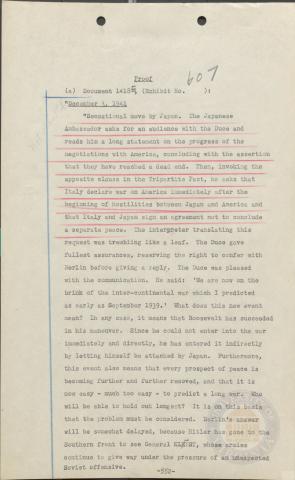
Page 552
| Parent | Collaboration between Japan, Germany and Italy Vol. VII |
|---|---|
| Date | |
| Language | English |
| Collection | Tavenner Papers & IMTFE Official Records |
| Box | Box 15 |
| Folder | Japan, Germany, Italy Collaboration Vol 7 |
| Repository | University of Virginia Law Library |
Proof
(a)Document 1418E, (Exhibit No. 607):
"December 3, 1941
"Sensational move by Japan* The Japanese
Ambassador asks for an audience with the Duce and
reads him a long statement on the progress of the negotiations with America, concluding with the assertion
that they have reached a dead end. Then, invoking the apposite clause in the Tripartite Pact, he asks that Italy declare war on America immediately after the beginning of hostilities between Japan and America and
that Italy and Japan sign an agreement not to conclude
a separate peace. The interpreter translating this
request was trembling like a leaf. The Duce gave
fullest assurances, reserving the right to confer with
Berlin before giving a reply. The Duce was pleased
with the communication. He said: 'We are now on the
brink of the inter-continental war which I predicted
as early as September 1939*' What does this new event
mean? In any case, it means that Boosevelt has succeeded
in his maneuver. Since he could not enter into the war
immediately and directly, he has entered it indirectly
by letting himself be attacked by Japan. Furthermore,
this event also means that every prospect of peace is
becoming further and further removed, and that it is
now easy - much too easy - to predict a long war. Who
will be able to hold out longest? It is on this basis
that the problem must be considered. Berlin's answer
will be somewhat delayed, because Hitler has gone to the
Southern front to see General KLEIST, whose armies
continue to give way under the pressure of an unexpected Soviet offensive.
